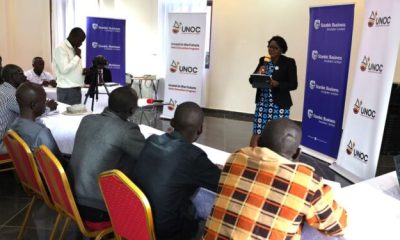Analysis
The costs of GMO delays in Uganda revealed
Researchers from Wageningen University in the Netherlands have concluded that over 5,500 Ugandans could have died because of food shortages arising from delays to enact the Biosafety and Biotechnology law.
The study, published July 31 in PLOS One journal, used modeling to calculate how delays in the introduction of three genetically engineered crops — cooking bananas (Matooke) resistant to black Sigatoka for Uganda, and biotech insect-resistant cow pea and maize in Kenya, Nigeria, Niger and Benin have adversely impacted lives in those countries.
The study findings could be a rude reminder to law makers and politicians that their actions and inn-actions have real consequences to the lives of millions of the people they represent.
Uganda is one of few African countries that have successfully conducted genetically modified crops research trials for over a decade. Cotton, banana, maize, rice, potato, sweet potato and cassava are crops that Uganda has successfully studied in confined field trials (CFTs).
The researchers argue that the adoption of biotechnology crops in Africa has been undermined by ambiguous and contradicting messages from developed countries and international organizations.
“The use of GE crops has been very controversial. African governments are in a dilemma as they face contradicting statements from international organizations. While organizations such as the United Nations, stress the importance of addressing malnutrition and urge countries to use modern biotechnology, they also warn about the environmental risks of using the technologies. Unsurprisingly, governments are uncertain about which is the right strategy to follow.”
The researchers add: “We have calculated the economic value of this uncertainty, which is substantial and costs lives. Scientists, policy makers, and other stakeholders have raised concerns that the approval process for these new crops causes delays that are often scientifically unjustified.”
In Uganda for example, the Black Sigatoka-resistant bananas were successfully produced in 2007 but have never reached farmers because of the absence of an enabling law.
“Uganda had the possibility in 2007 to introduce the black sigatoka resistant banana, thereby potentially saving between 500 and 5,500 lives over the past decade,” researchers say.
The study did not assess the environmental and health benefits from reduced pesticide use associated with growing disease – and insect-resistant crops, which the authors characterized as “an important area for future research.”
Although not yet studied, Uganda has successfully produced Vitamin A enhanced cooking bananas among other GM crops that could potentially transform the lives of millions of Ugandans especially the poor.
Vitamin A is an essential micro nutrient for the proper development of a child. Vitamin A deficiency is one of the main causes of child stunting. Vitamin A deficiency is also associated with poor brain development.
The delay has not only impacted the nation’s economic gains but contributed immensely to infant mortality and stunted growth. The Uganda Demographic and Health Survey conducted in 2016 by Uganda Bureau of Statistics (UBOS) indicated that 64 children out of every 1000 born alive, die every year in Uganda.
Last week, a local daily newspaper reported that the government’s own National Planning Authority (NPA), with support from the United Nations World Food Program, had launched a study showing 1.8 million Ugandan children are stunted. The report called for the quick adoption of the biotechnology as a way to address the high level of child stunting.
The NPA’s Executive Director, Dr. Joseph Muvawala, urged Parliament to fast-track the enactment of the biosafety law as a means to address this disturbing challenge. When enacted, the biosafety law, will allow vulnerable small-holder farmers to access the currently locked-up GM crop varieties.
The NPA report further shows that Uganda’s average calories per day of 1,860 per person are below the 2,200 target set in the Sustainable Millennium Development GoalSome of the consequences include poor cognition and educational performance, low adult wages, lost productivity, and excessive weight gain later in childhood that leads to an increased risk of nutrition-related chronic diseases in adult life. At the opening of the annual Agricultural Exhibition in July 2017, Ugandan President H.E Yoweri Kaguta Musveni referred to the delay by MPs in passing the Biosafety Bill as, “a bad mistake”. This “mistake,” according to Wageningen University’s research, is indeed a fatal mistake.
The Wageningen report has helped put a cost to stunting by quantifying how many deaths Uganda could have avoided had it provided farmers with the nutrient-laden food crops that are locked-up because there is no biosafety law in place. For a country, findings like these that are done by both national and international agencies should evoke actions, as the impact is grave for the future.
On their part, NARO scientists appear to have done their job. But they need law-makers to provide an enabling environment where they can achieve the national goal of a food secure Uganda. The 1.8 million estimated stunted Uganda children and the real loss of lives will in no way be blamed on scientists who work selflessly.
Members of Parliament should step-up and do their job promptly. Otherwise they will be held responsible for the preventable impaired growth and deaths of innocent Ugandans.
Mr Ongu is an Agricultural Communications Expert
isaacongu@gmail.com
Comments



























